World Geography And Politics Daily News | 24 Jun 2023

Views (127)
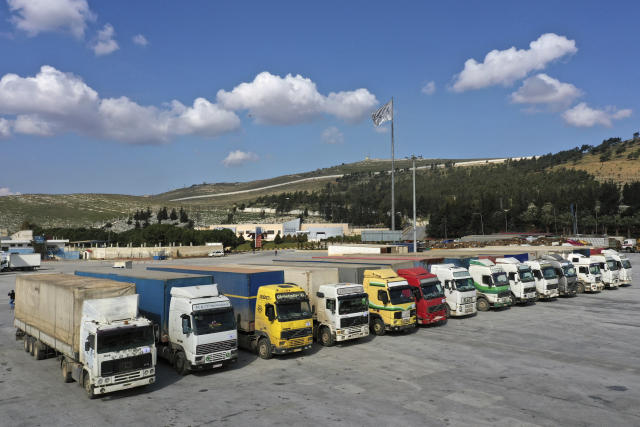
Growing alarm at rise in violence in occupied West Bank
The United Nations human rights chief and the European Union have expressed alarm over ongoing violence in the occupied West Bank, and over attacks by settlers on Palestinian villagers. But a prominent member of the government led by Prime Minister Benjamin Netanyahu has called for illegal settlers’ outposts to be expanded and turned into full settlements.
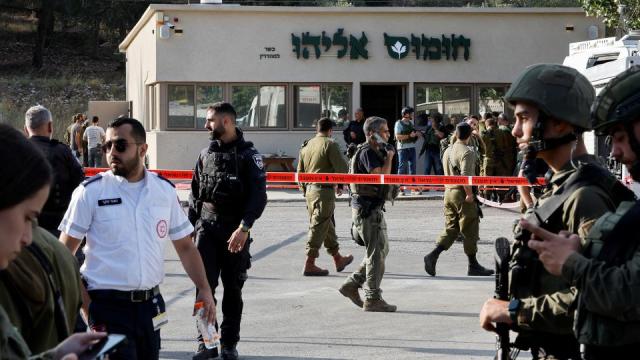
The United Nations human rights chief and the European Union have expressed alarm over ongoing violence in the occupied West Bank, and over attacks by settlers on Palestinian villagers. But a prominent member of the government led by Prime Minister Benjamin Netanyahu has called for illegal settlers’ outposts to be expanded and turned into full settlements.
Hundreds of Israeli settlers attacked the Palestinian village of Turmusayya in the West Bank on Wednesday, the day after the killing of four Jewish settlers nearby, according to the mayor of the village. Those killings had been in response to an Israeli military operation in the Jenin area.
The EU representative to the Palestinians, joined by more than 20 diplomatic missions from the EU and beyond, has visited Turmusayya “to express condolences to the victims of the settler attacks on 21 June and see the houses and property impacted,” the mission said on Twitter.
The chief spokesman for the Israel Defense Forces (IDF) also condemned the settler attacks in Turmusayya and Urif. Rear Admiral Daniel Hagari described the incident as “very grave.”
“This is an incident that creates terror and escalation, and takes the population that isn’t involved in terror and pushes it [toward extremism], while preventing the IDF from fighting terror in operational activities,” he told Army Radio.
UN Human Rights chief Volker Türk said the violence this week risks “spiraling out of control, fueled by strident political rhetoric and an escalation in the use of advanced military weaponry by Israel.”
The Israeli military operation in the Jenin refugee camp on Monday, which included airstrikes from helicopters, left at least seven Palestinians dead. At least 91 Palestinians and seven Israeli soldiers were injured.
Security personnel work at the scene of a shooting attack that killed four Israelis near the Jewish settlement of Eli on June 20, 2023. - Ammar Awad/Reuters
Türk said the operation represented a major intensification of the use of weaponry more generally associated with the conduct of armed hostilities rather than a law enforcement operation.
“Israel must urgently reset its policies and actions in the Occupied West Bank in line with international human rights standards, including protecting and respecting the right to life,” he said.
Türk also said he was appalled that the killings of the Israeli settlers were celebrated by some Palestinians.
Amongst other international reaction to this week’s violence, the Turkish Foreign Ministry said it was “deeply concerned about the increasing tension,” and condemned the reported desecration of the Quran in one West Bank mosque.
“We also condemn the attacks by settler groups in various parts of the West Bank and the killing of a Palestinian civilian by Israeli forces,” Turkey said Friday.
Earlier this week, the Moroccan Foreign Ministry announced the postponement of the meeting next month of the Negev Forum, which brings together Morocco and three other Arab states with Israel and the US, citing a negative political environment.
The United Arab Emirates Friday called on the Israeli authorities “to reduce escalation and avoid steps that exacerbate tension and violence in the Palestinian territories.”
In Israel, the organization Peace Now has condemned the “promotion of settlements, legalization of outposts, settler violence, and more urgent developments in the West Bank.”
The Israeli government has announced that 1,000 housing units will be built in the settlement of Eli in the West Bank. Peace Now said that the government had decided to legalize one outpost (Evyatar) created by settlers, while several more such outposts had been established.
Peace Now said it seemed “there are no barriers or constraints in disregarding Palestinian lives and promoting settlements in the occupied territories.”
It said that the “Netanyahu’s government’s complicity in allowing and supporting settler outposts fuels an already volatile situation in the occupied Palestinian territories, intensifying violence against innocent Palestinians by extremist settlers.”
But government ministers seem unmoved. Visiting the Evyatar outpost Friday, National Security Minister Ben Gvir said: “We need to have a whole and full settlement here. Not only here but in all the hills around us.”
“We should settle the Land of Israel, and at the same time, launch a military operation, take down buildings and eliminate terrorists. Not just one or two, but dozens and hundreds and if needed, thousands,” Ben Gvir said.
“The whole situation looks like it’s out of control and it is very hard to see how it’s going to be put back in the box because the Palestinian Authority is crumbling,” the former US ambassador to Israel Martin Indyk told CNN’s Becky Anderson on Friday.
US, European allies demand action to end Russia's use of Iranian drones in Ukraine
The U.N. has not opened investigations into Russia's use of Iranian drones in Ukraine, which violates U.N. Security Council Resolution 2231, which requires approval for transfer of weapons from Iran.
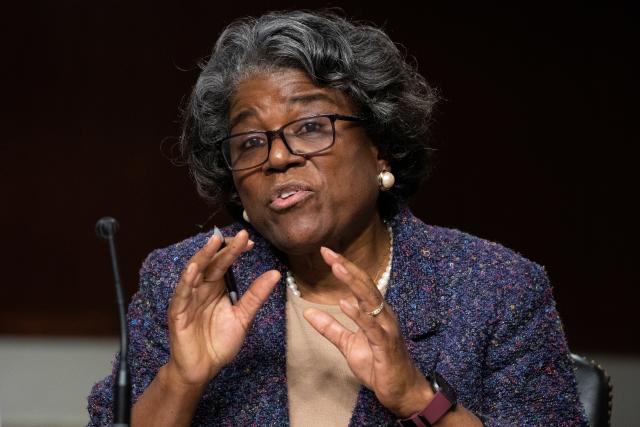
"Earlier this month, the United States released further information documenting how Iran has provided Russia with hundreds of one-way attack UAVs (unmanned aerial vehicles), as well as UAV production-related equipment. Ukraine and the U.K. also submitted evidence to the U.N. of Iranian UAVs recovered by the Ukrainian armed forces," Linda Thomas-Greenfield, United States Ambassador to the United Nations, told reporters.
"Russia has not only procured hundreds of Mohajer and Shahed series UAVs from Iran in clear violation of Resolution 2231, but it is also now working with Iran to produce these weapons inside Russia," she continued, reading a statement on behalf of the U.S., the U.K., France, Ukraine and Albania.
When confronted with the counterclaim that Secretary-General António Guterres does not have the mandate to launch an investigation, Thomas-Greenfield claimed that Resolution 2231 "does give the Secretary-General a mandate to carry out these investigations, and we have all encouraged the U.N. to move forward on carrying out these investigations immediately."
"Russia’s and Iran’s actions violate U.N. Security Council Resolution 2231," Thomas-Greenfield said. "That resolution prohibits all countries, including permanent members of the Security Council, from transferring these types of weapons from Iran, absent advance Security Council approval. Approval was, of course, not given."
Farhan Haq, Deputy Spokesperson for the U.N. Secretary-General, told Fox News Digital, "The Secretariat continues to analyze information received with regard to the alleged transfer of uncrewed aerial vehicles by Iran in a manner inconsistent with paragraph 4 of Resolution 2231 (2015) and will report to the Security Council in due course."
"The next report will be discussed at a meeting at the experts’ level on implementation of Resolution 2231 (2015) in late June and then by the Council in a briefing next month," he added.
"As of May, Russia received hundreds of one-way attack UAVs, as well as UAV production-related equipment, from Iran," NSC Coordinator for Strategic Communications John Kirby said.
Kirby noted that a graphic released at the time "shows how Iranian drones are being transferred to Russia: the drones are built in Iran, shipped across the Caspian Sea, from Amirabad, Iran, to Makhachkala, Russia, and then used operationally by Russian forces against Ukraine."
"Russia and Iran’s actions are violations of their obligations under U.N. Security Council Resolution 2231 by participating in these transfers of drones from Iran to Russia without UN Security Council approval," Kirby said of the situation. "We will continue to work with allies and partners and with the U.N. on ways to hold them accountable."
Iran Is the Middle East's Most Dangerous Tinderbox
Ian Bremmer on the myriad problems and pressures that Iran faces today
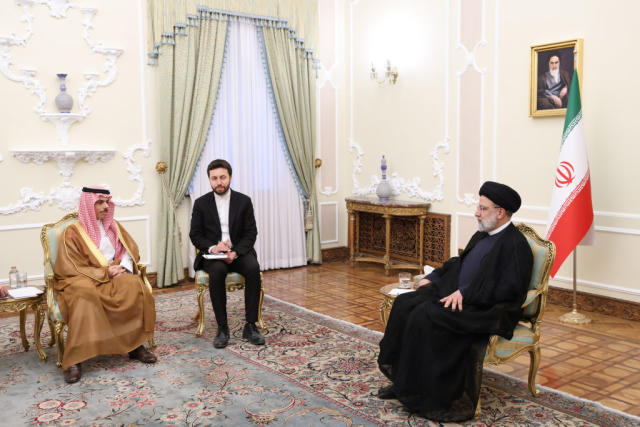
Iranian President Ebrahim Raisi (R) meets with Saudi Arabian Foreign Minister Faisal bin Farhan Al-Saud (L) in Tehran, Iran on June 17, 2023. Credit - Iranian Presidency / Handout-Anadolu Agency
But Iran’s leaders know their reprieve from pressure will prove temporary. Economic strain continues. Thanks mainly to sanctions, Iran’s currency has lost more than 90% of its value against the dollar over the past decade, and price inflation remains above 40%. Benefits from better relations with the Saudis will take time to materialize, and the rapprochement will likely remain tentative. President Ebrahim Raisi’s “Turn to the East” strategy is intended to bring major new infrastructure investment from both Russia and, more importantly, China, but Russia’s own economic outlook remains perilous, a wartime partnership with the Kremlin will bring new sanctions on Iran, and the Chinese can buy large volumes of heavily discounted oil from Russia, leaving Iran out in the cold.
None of this is new for Iran. A feeble economy and cycles of protest and repression are all too familiar. Yet, lurking in the background are both hope and dread that fundamental change may not be far away.
Finally, there are the continuing risks created by Iran’s nuclear program and the inability of Iranian and Western leaders to broker a new deal over its future. Here, too, the tensions aren’t new, but ever higher levels of uranium enrichment bring closer the day when Israeli and American policymakers must decide how to block Iran from acquiring a nuclear weapon that could trigger a dangerous arms race in the Middle East.
It might appear that the problems Iran creates for itself and those it poses for outsiders never change. Yet the risk is rising that Iran will soon become one of the world’s most dangerous wild cards.
Serbia again threatens armed intervention in Kosovo as tension escalates
Serbia on Friday reiterated a threat to intervene militarily in its former province of Kosovo if NATO-led peacekeepers there fail to protect minority Serbs from what Belgrade called the terrorist threat of Kosovo’s ethnic Albanian authorities. In a brief televised address, the Serbian army chief-of-staff, Gen. Milan Mojsilovic, said Kosovo Serbs can no longer “tolerate the terror” of the Kosovo government, and that Serbia's military stands ready to fulfil its tasks “in accordance" with the Serbian constitution and any orders from President Aleksandar Vucic.
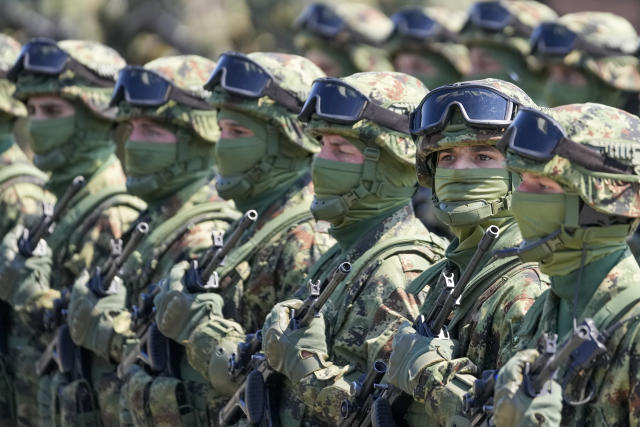
BELGRADE, Serbia (AP) — Serbia on Friday reiterated a threat to intervene militarily in its former province of Kosovo if NATO-led peacekeepers there fail to protect minority Serbs from what Belgrade called the terrorist threat of Kosovo’s ethnic Albanian authorities.
In a brief televised address, the Serbian army chief-of-staff, Gen. Milan Mojsilovic, said Kosovo Serbs can no longer “tolerate the terror” of the Kosovo government, and that Serbia's military stands ready to fulfil its tasks “in accordance" with the Serbian constitution and any orders from President Aleksandar Vucic.
Serbia's armed intervention in Kosovo would mean a direct clash with some 4,000 NATO troops currently stationed there.
Serbia and its former province of Kosovo have been at odds for decades. Their 1998-99 war left more than 10,000 people dead, mostly Kosovo Albanians. Belgrade has refused to recognize Kosovo’s 2008 declaration of independence.
The latest flareup focused on Kosovo police arresting at least eight Serbs who are suspected of taking part in last month’s violent clashes with the NATO troops and Kosovo police, leaving dozens of injured on all sides.
In his brief address to the nation on Friday, the Serbian army chief-of-staff said that Kosovo Serbs can no longer “tolerate the terror of the regime of” Kosovo Prime Minister Albin Kurti.
“According to the facts, I informed the commander of KFOR that we demand urgent measures to protect the Serbian people," Mojsilovic said. “This is our request to KFOR and other international organizations.”
In their meeting in Brussels on Thursday, the leaders of Serbia and Kosovo made no breakthrough in EU-hosted emergency talks amid fears of a return to open conflict.
EU’s foreign policy chief Josep Borrell described the soaring ethnic tensions in northern Kosovo as alarming.
“Despite yesterday’s crisis meeting, escalation continues (and) is becoming dangerous,” he said Friday on Twitter. “We will not tolerate it.”
NATO Secretary-General Jens Stoltenberg on Thursday vowed that the alliance’s peacekeepers “will continue to act impartially” and increase its presence to ensure environment and freedom of movement for all communities in Kosovo.
Both Serbia and Kosovo are seeking EU membership, and need to normalize their relations to do so.
There are fears that Serbia's ally Russia could inflame another armed conflict in central Europe to divert at least part of the international focus from Moscow's aggression in Ukraine.
US, UK, France demand UN investigate Russia's sanctions-busting use of Iranian drones in Ukraine
The United States, Britain and France demanded Friday that the United Nations urgently investigate Russia’s reported use of hundreds of Iranian-provided drones in the war in Ukraine, which would violate U.N. sanctions. Russia denies using the Iranian drones, despite widespread evidence that they have been used to attack Ukrainian cities.
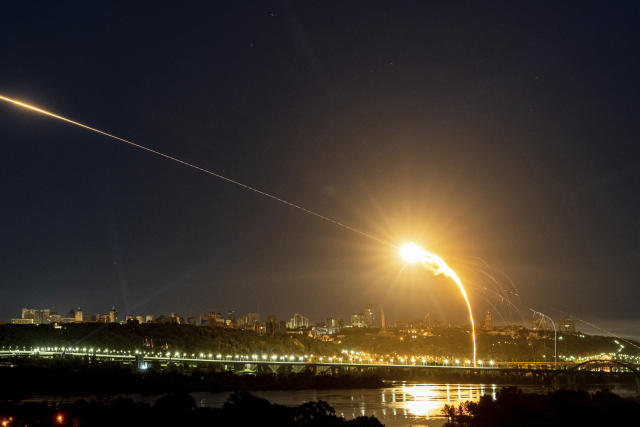
UNITED NATIONS (AP) — The United States, Britain and France demanded Friday that the United Nations urgently investigate Russia’s reported use of hundreds of Iranian-provided drones in the war in Ukraine, which would violate U.N. sanctions. But it’s unclear whether the U.N. will do so in the face of strong opposition from Russia.
U.S. Ambassador Linda Thomas-Greenfield noted that the U.S. this month released further information documenting Iran's provision of hundreds of unmanned aerial vehicles, known as UAVs or drones, as well as equipment that can be used in their production. Ukraine and the U.K. also submitted evidence to the United Nations of Iranian drones recovered by the Ukrainian military, she said.
“This is a matter of life or death for the Ukrainian people,” the U.S. ambassador told the U.N. Security Council after delivering the statement calling for an investigation, which also was signed by Albania and Ukraine.
The 2015 resolution prohibits all countries from transferring such weapons from Iran without advance Security Council approval, which was not given, the statement said.
U.N. deputy spokesman Farhan Haq said the U.N. Secretariat, which is headed by U.N. Secretary-General Antonio Guterres, is still analyzing information it received regarding “the alleged transfer of un-crewed aerial vehicles by Iran in a manner inconsistent” with the 2015 resolution.
He said a report expected soon from Guterres will be discussed this month by experts on the committee monitoring implementation of the resolution, and by the 15-member Security Council in July. Russia is one of five permanent members with veto power.
Thomas-Greenfield told reporters the resolution gives the secretary-general a mandate to open an investigation. Haq gave no indication of whether Guterres would do so.
Russia’s U.N. Ambassador Vassily Nebenzia told the Security Council that Ukraine has not given Russia or Iran an “iota of credible evidence” about the use of Iranian drones.
“We hope that the secretary-general has sufficient wisdom not to be misled by our former Western partners,” Nebenzia said.
UN aid enters Syrian rebel enclave from government territory in first such crossing since earthquake
A convoy carrying U.N. aid entered Syria’s last rebel-held enclave from government-held territory on Friday, the first such shipment to cross battle lines since February’s deadly 7.8-magnitude earthquake that hit Turkey and Syria. The convoy with humanitarian supplies crossed from a government-controlled area in the province of Aleppo, and entered Idlib, according to the U.N. office for humanitarian affairs or OCHA. After the February earthquake that struck Turkey and northern Syria, causing wid
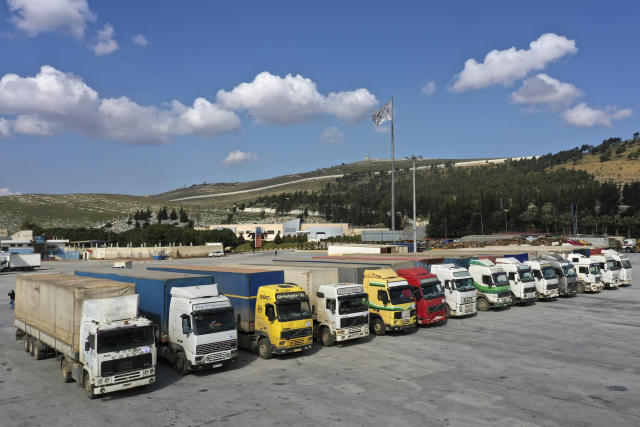
IDLIB, Syria (AP) — A convoy carrying U.N. aid entered Syria’s last rebel-held enclave from government-held territory on Friday, the first such shipment to cross battle lines since February’s deadly 7.8-magnitude earthquake that hit Turkey and Syria.
The convoy with humanitarian supplies crossed from a government-controlled area in the province of Aleppo, and entered Idlib, according to the U.N. office for humanitarian affairs or OCHA. The last aid shipment to cross the front lines in the conflict was in early January.
After the February earthquake that struck Turkey and northern Syria, causing widespread destruction, convoys have been prevented from entering the province of Idlib from government-held areas by the al-Qaida-affiliated militant group Hayat Tahrir al-Sham, which dominates the area.
The group has sought to distance itself from al-Qaida in recent years. After the Feb. 6 quake, an administrative arm of the group accused the government of Syrian President Bashar Assad of trying “to benefit from the aid intended for victims of the earthquake.”
In the wake of the earthquake, aid deliveries to affected areas became a political battleground, with Assad's opponents and many aid organizations pushing for the United Nations to send more aid shipments to northern Syria by way of Turkey. Meanwhile, the Syrian government and its ally, Russia, pushed for the aid to be sent via Damascus.
The U.N. is usually only allowed to deliver aid through a single border crossing from Turkey, at Bab al-Hawa, at the insistence of Russia, which is a permanent member of the United Nations Security Council.
After the earthquake, Assad agreed to the opening of two new crossing points from Turkey, at Bab al-Salam and al-Raee on a temporary basis. In practice however, most of the cross-border aid continued to come via Bab al-Hawa. The mandate for cross-border aid deliveries at Bab al-Hawa is up for renewal next month at the Security Council.
Representatives of Hayat Tahrir al-Sham have declined to comment on the reasons for their change in stance on aid coming from government-held areas. But Sam Heller, a fellow with the New York-based Century International research center, said the group’s decision may be related to next month's vote at the U.N.
He said Russia’s U.N. envoy has complained about the lack of cross-line deliveries, and allowing one now may have been intended to encourage Moscow to approve the continuation of cross-border aid.
"The cross-border mandate will only be renewed with Russia’s consent," he said.
Syria Response Coordination Group, a humanitarian organization working in northwest Syria, said in a statement that “humanitarian convoys have been at the mercy of international political tensions” and called for international organizations to find ways to increase the amount of assistance reaching the area.
___
Sewell reported from Beirut.
0 Likes
